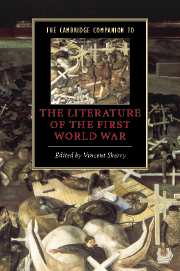Book contents
- Frontmatter
- Introduction
- Part I The Great War in British literary culture
- 1 British war memoirs
- 2 The British novel and the war
- 3 The Great War, history, and the English lyric
- 4 British women’s writing of the Great War
- 5 The Great War and literary modernism in England
- Part II The world war: Pan-European views, transatlantic prospects
- Part III Postwar engagements
- Guide to Further Reading
- Index
- Series List
2 - The British novel and the war
from Part I - The Great War in British literary culture
Published online by Cambridge University Press: 28 May 2006
- Frontmatter
- Introduction
- Part I The Great War in British literary culture
- 1 British war memoirs
- 2 The British novel and the war
- 3 The Great War, history, and the English lyric
- 4 British women’s writing of the Great War
- 5 The Great War and literary modernism in England
- Part II The world war: Pan-European views, transatlantic prospects
- Part III Postwar engagements
- Guide to Further Reading
- Index
- Series List
Summary
In James Hanley's The German Prisoner (1930), two defiantly proletarian British soldiers, O'Garra and Elston, lose contact with their unit during an assault on the German lines. The “fog of war” has had the effect, it seems, of putting them once and for all beyond authority's reach. They capture a young German soldier called Otto Reiburg whose fair hair and fine clear eyes represent to them a provocatively bourgeois “grace of body.” The buried “rottenness” in O'Garra shoots up like filth from a sewer in a deathly premature ejaculation. O'Garra and Elston begin to beat Reiburg unconscious. Elston urinates on him. O'Garra drives a bayonet into his anus. “Elston laughed and said: 'I'd like to back-scuttle the bugger.'” And that appears to be that. The worst obscenity, in a performance obscene from beginning to end, is that Reiburg remains unraped. The Sadean utopia O'Garra and Elston have built for themselves inside war's thickening excremental fog is dedicated to the pursuit of death alone. A shell duly puts an end to them both.
Gunn, the veteran protagonist of Liam O’Flaherty’s Return of the Brute (1929), is another man subject to deathly ejaculations. The object of Gunn’s desire is a raw recruit feminized by cowardice, whose timidity becomes to him a “seductive temptation.” He at once gives in to and overcomes temptation by murdering a sadistic corporal, as it were on his friend’s behalf, while they are out on a raid. “Now he was really an animal, brutish, with dilated eyes, with his face bloody.” Gunn has joined O’Garra and Elston inside the fog of war.
- Type
- Chapter
- Information
- Publisher: Cambridge University PressPrint publication year: 2005
- 4
- Cited by

